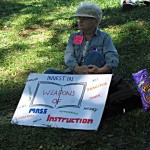Remember my blue-green Volvo? Of course you don’t. You remember my green-blue Volvo.
In any case, I’m thinking about the problem of color again, so watch out.
Blame it on the University of Chicago and its blasted alumni magazine. The latest issue has a fascinating article on new findings about how the brain processes what the eye sees.
For instance, when we see a stop sign, we think we see a red octagon, but we’re really seeing a red thing and an octagonal thing—perception of color and shape involves different neural pathways. A third area of the brain turns the two properties into a single object: the redoctagon. Things may be holistic out there, but in here [tapping his head] they ain’t.
And when things go wrong, light gets shed on these processes:
Some rare neurological disorders exemplify the brain’s separation of object properties, rendering patients unable to identify whole objects—a process called object representation. “So I say to you, ‘Touch the square,’ you can do it. ‘Point out the green thing,’ you can do it. But if I say, ‘Point out the green square,’ you can’t,” [neuroscientist Steve] Shevell says.
Color—its “reality” and its perception—presents real challenges. Newton cracked his brain over it; so did Goethe. But it’s still a big mess, if you ask me.
A coworker used to talk about the “green” navigational elements on our website. I’d say, “You mean those blue bits?” We didn’t come to blows over it, but we never resolved it, either. The fact remains, they’re basically bluish with a hint of green. Trust me.
Our CFO, on the other hand, once mentioned the “brown” areas on the home page. The rest of us looked at each other incredulously. They’re burgundy! (Or at least, by consensus, a shade of red.) There must be something wrong with her monitor! Only there wasn’t.
It’s a truism that everyone sees things a little differently, and apparently it’s even more truistic for color (even leaving aside questions of taste* or pathologies like color blindness). So who, if anyone, gets to decide what’s green and what’s blue? Are there people with “perfect tint” like those with “perfect pitch”? And if I get such a person to color-correct my monitor, what good would it do if everyone else sees each color their own way?
To illustrate the problems the brain faces, or creates, in the area of color perception, look at these rings (which appear in the article cited above):

The top two circles each include an identical orange ring. Same with the blue rings in the bottom pair—they’re identical. To satisfy myself that this is actually the case, I made circles outside the rings, against the white background, and used an eyedropper in my graphics program tool to fill them with the orange and blue tones in the rings. Mouse over the image to see the result.
Seeing is believing? Well, yes and no.
__________
*Why, just today just such an issue came up. I had replaced a couple of spotlight bulbs in the upstairs hallway with compact fluorescent lamps. My dear wife lost no time expressing her hatred of the “ugly green light” they produce. Now, I readily admit that standard CFLs throw a greenish cast. But it doesn’t kill me like it does her. (She says she’s more visual than I am, that’s why I don’t care; but it seems to me the word she’s looking for is picky.)















![Remedios Varo [?] Remedios Varo painting - or not](https://basement.marginata.com/wp-content/uploads/2010/09/RemediosVaro_450px.jpg)


















